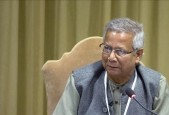2020 年安徽省中小学教师考编英语省略虚拟语气句法阜阳师出教育知识要点
- 好文
- 2024-11-10 07:53:02
- 7
省略

为了使讲话和行文简洁,句中某些成分有时可省略。 省略可分以下几种情况:
一、简单句中的省略
1.省略主语:祈使句中主语通常省略,其它省略主语多限于少数现成的说法。
2.省略主谓语或主谓语的一部分。
3.省略作宾语的不定式短语,只保留 to。
4.省略表语。
5.介词的省略
6.名词所有格后面的名词,如果是表示住宅,店铺,教堂或者上下文已经暗示或明确指出过的事物时常省略。
7.连词的省略:
8.情态动词 should 的省略
二、并列句中的省略
两个并列分句中,后一个分句常省略与前一分句中相同的部分。
三、主从复合句中的省略
1.状语从句中的省略
2.定语从句中的省略
①一般说来,在限制性定语从句中,作宾语的关系代词 that,which, whom 可以省略。
②当先行词为表示方式的 the way 时 ,从句不能用 how 来引导 ,应该用that 或 in which ,或将它们全部省略。
3.宾语从句中的省略
①在及物动词后面所接的宾语从句中,连词 that 一般可以省略;但如果及物动词后面是由 that引导的两个或两个以上的并列的宾语从句 ,那么只有第一个 that可以省略。
②由 which, when,where, how,和 why 引导的宾语从句,可以全部或部分省略。
4.主语从句中的省略
主语从句省略多用于句首。
虚拟语气
虚拟语气主要指的的是带有非真实条件状语从句的复合句,表达的是说话人的遗憾后悔的语气,愿望以及建议,命令,要求等等的情感,往往说的是与事实相反或者没办法实现改变的东西。
1.条件从句虚拟语气的基本用法
虚拟的时间
从句
主句
例句
与现在事实相反
主语 did/were
主语 should / would/
could / might do
If I were you, I would accept his offer.
与过去事实相反
主语 had done
主语 should / would/ could / might have done
If you had studied hard before, you would have passed the exam.
对将来事实不确定的假设
主语
1.did
2.should do
3.were to do
主语 should / would/
could / might do
If it rained/should rain/were to rain tomorrow, I would stay at home.
在上面表格里反映的是非真实条件句的虚拟语气模式,从句和主句的谓语动词时间是一致的,如果两者时间不一致,此时就是混合型虚拟语气。
2.混合型虚拟语气
混合型虚拟语气的使用要求“各自为政”,即从句和主句根据各自假设的时间不同,采用上面表格中对应的的谓语动词形式,同时注意句中时间状语的暗示。
If I had seen you, I would not be so worried now. (从句是对过去的假设,主句是对现在的假设)
If I had made some money last summer, I would go on holiday next month.( 从句是对过去的假设,主句是对将来的假设)
3.省略if的非真实条件句
虚拟语气在if引导的条件状语从句中,特别注意虚拟语气与倒装的结合,前提是省略if,这种情况多见于过去和将来的假设,具体表现是将if省略,把had, were, should之类词语提前构成倒装。
Were I you, I would go.
Should it happen, what should you do?
Had he recognized me, he would have come over.
4.含蓄虚拟语气
有时假设的情况并不是以if引导的条件从句形式出现,而是通过一些短语等形式暗示虚拟语气的存在,常用的词语有without, but for, otherwise, or等等。
But for your encouragement, I would not have been admitted to this university.
Without water, all lives would die.
He felt too tired yesterday, or he would have attended my party.
I was having a meeting, otherwise I would have come to see you off.
5.虚拟语气的其他用法
①虚拟语气的另一个重要知识点就是should v.的用法,主要是有关建议和命令的相关从句,包括主语从句,宾语从句,表语从句,同位语从句以及以之相关的形式主语/宾语之类的从句。这一部分的词主要有常见的动词有advise, suggest, insist, order, require, recommend, command以及相关名词等;常用的形容词important, necessary, right, advisable, natural, strange, surprising, regretful,urgent, vital, insistent, essential等;常用的名词duty, pity, no surprise, no wonder, shame, regret等(其实这些词在句子中其实也有建议命令类似的的意思)。如:
The general ordered (that) all the soldiers (should ) leave.
He gives orders that the soldiers (should) leave.
My suggestion is that we (should) stay here for a rest.
It’s important that you (should) take the medicine.
It was suggested that he (should) join the club activities.
②would rather, It’s time…, for fear that…
■ would rather在使用时要注意它的不同用法。因为本身would rather可以直接接动词原形,构成would rather do sth. (than do sth.else); 或者would do sth. rather than do sth. else.而虚拟语气的would rather 是这样使用的:would rather sb. did(对现在或将来的假设)/ had done(对过去的假设)
I would rather he didn’t go now.
They would rather they hadn’t attended the party.
■ It’s (about) (high) time (that)…从句中常用过去式(有时也用should do), 含建议的意思。汉语的意思为“是该做…的时候了”,也等于It’s time for sb. to do sth.
It’s high time (that) we went home.
It’s high time that we should go home.
It’s high time for us to go home.
■ for fear that 后面可以接虚拟语气should do,也可以接其他语气,但依然会有一个情态动词。
I will not make a noise for fear that I should / might disturb you.
③wish 从句; as if/ though 从句; If only这三种情况的虚拟语气
■ wish后的宾语从句,谓语动词要用虚拟语气,其形式主要有三种wish sb. did(对现在的虚拟); wish sb. had done(对过去的虚拟); wish sb. would do (对将来的虚拟)。偶尔在对过去的虚拟时,也会出现wish sb. would have done的情况。
I wish I knew what was going to happen.
She wished she had stayed at home.
I wish I would have seen her last night.
■ as if/ though出现的虚拟语气主要有两种情况:主句 as if/ though引导的状语从句; seem/ look/ smell as if/ though引导的表语从句。
(1)主句 as if/ though引导的状语从句:主句 as if/ though 主语 did/ were(对现在的假设);主句 as if/ though 主语 could/ would do(对将来的假设);主句 as if/ though 主语 had done(对过去的假设)
She talks about New York as if she had been there before.
(2)seem/ look/ smell as if/ though引导的表语从句:情况基本上和上面一致。
You look as if you didn’t care.
④If only引起的感叹句要用虚拟语气,表示愿望。形式为:用过去式或者would/ could do, 表示与现在或未来事实相反的愿望; 用过去完成式表示与过去事实相反的愿望。
If only he were here!
If only you would listen to our advise!
If only I had not been busy last week!























